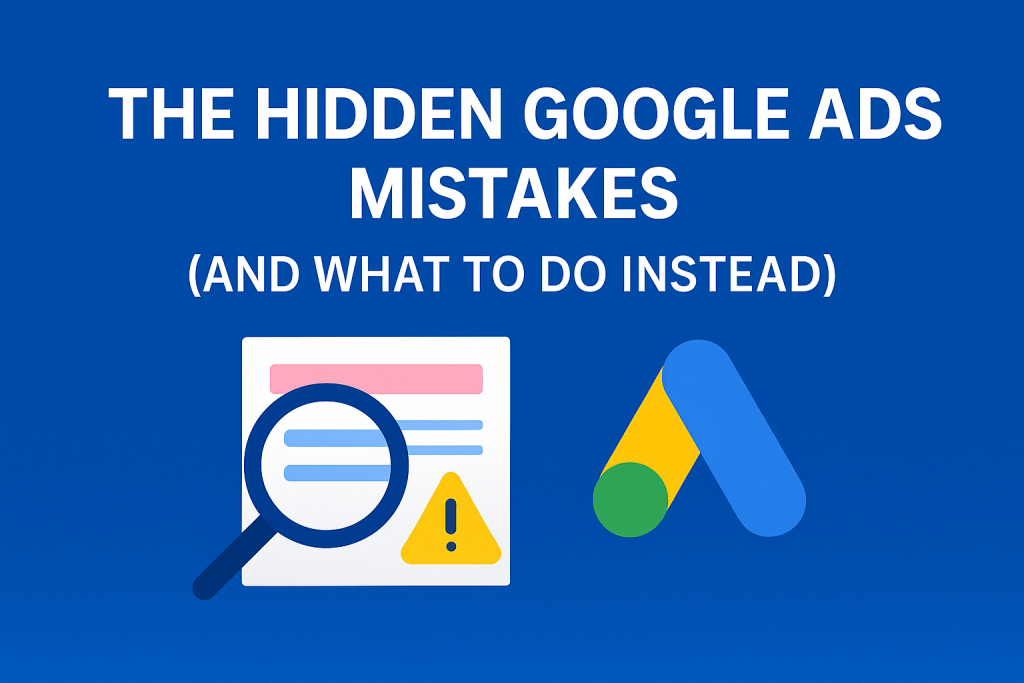
The Hidden Google Ads Mistakes That Drain Your Budget (And What to Do Instead)
Google Ads can be a powerful growth engine — but most businesses are leaking money every single day due to poor structure, bad targeting, or weak landing pages. In this post, we’ll break down the most common Google Ads mistakes (and how to fix them) so you can maximize ROI and avoid becoming another cautionary tale.
1. Sending Traffic to Your Homepage
Most businesses still direct their Google Ads to a generic homepage. This kills Quality Score and conversions. Instead, create a dedicated landing page for each campaign. Instead, consider working with a Google Ads management expert who understands how to align campaign intent with user experience.
- Match headline to ad copy
- Focus on one clear call-to-action
- Remove navigation distractions
Fix This:
Use purpose-built landing pages for each ad group. Tools like Unbounce or a custom Tailwind/CSS layout will dramatically increase performance. Better yet, partner with a landing page design service that specializes in high-converting, ad-specific layouts.
2. Not Tracking Conversions Properly
You can’t optimize what you can’t measure. Many accounts track only clicks or impressions but ignore what matters — leads and sales. Consider a PPC consultant to audit and configure your conversion tracking if you’re unsure where to begin.
“We cut a client’s cost per lead in half just by fixing their conversion tracking.”
Set up Google Tag Manager + Google Ads conversion tracking with form submissions, phone calls, and purchases.
3. Bidding on Broad Match Without Negatives
Broad match can tank your budget fast. Without negative keywords, you’re paying for irrelevant traffic.
- Audit search terms weekly
- Add negatives by intent (“free”, “DIY”, etc.)
- Use phrase and exact match for control
What You Should Do Instead:
Start with tightly themed ad groups, build a solid negative list, and scale once you see profitable patterns.
4. Ignoring the Landing Page Experience
Google uses landing page experience as a Quality Score factor. If your page is slow, irrelevant, or disorganized, you’ll pay more per click — and convert less.
- Use fast hosting and lazy loading
- Test multiple versions with A/B testing
- Optimize for mobile-first UX
Pro Tip:
Add trust signals (reviews, guarantees, badges) above the fold to boost credibility.
5. Forgetting to Test Ad Copy and Extensions
Too many businesses write one ad and call it a day. But split-testing your ad copy and using all available extensions can significantly improve CTR and Quality Score.
- Test different headlines and descriptions
- Use site links, callouts, and structured snippets
- Emphasize unique selling points (USPs)
Rotate ads evenly and measure performance. Even small changes in wording can lead to big differences in conversions.
Want an Expert Audit of Your Google Ads?
We’ve helped businesses cut waste, boost conversions, and scale profitably with targeted PPC strategies. Request a Free PPC Audit →
Frequently Asked Questions
What is the most common Google Ads mistake?
Sending traffic to a generic homepage without relevance or a clear call-to-action is one of the biggest mistakes businesses make. It hurts conversions and Quality Score.
Why is conversion tracking important?
Without accurate conversion tracking, you can’t optimize for leads, sales, or ROI. You’re flying blind and may waste budget on poor-performing keywords or ads.
What are negative keywords and why use them?
Negative keywords prevent your ads from showing on irrelevant searches. They improve ad relevance and reduce wasted spend.
Do I really need a separate landing page for each ad?
Yes. A custom landing page aligned with each ad group increases Quality Score, lowers CPC, and improves conversions significantly.
How often should I optimize my Google Ads campaigns?
At minimum, you should review search terms, ad copy, and bids weekly. High-performing accounts optimize daily or with automation rules.

